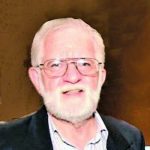
President Trump’s decision to launch missiles against Syria has global repercussions and puts America in confrontation with Russia. Was it a dangerous move?

~By Kenneth Tiven
Traditional science, generally, deals with supposedly predictable phenomena like gravity, electricity or chemical reactions. Chaos Theory deals with non-linear things that are effectively impossible to predict or control: American President Donald Trump, for example. He warned us on the campaign trail when he said: “We must as a nation be more unpredictable.”
Reality television depends on bursts of activity in each episode to keep the audience coming back. As host of the Apprentice Show, Trump fired people each week. Should anyone be surprised that what passes for policy is any different? Or that firing off 59 Tomahawk missiles gave him some complimentary punditry as a gunslinger.
There is a curious relationship between how this Administration behaves and the way television is consumed in the US today. Much of TV is episodic and these used to be spaced out, broadcast once a week. Today, with internet-delivered programs on demand, many people behave like my family— sitting and watching 24 episodes of a programme sequentially. Binge watching. The Trump Administration binges on a topic until exhausted.
Let’s take Syria as a series about a strife-torn nation in the midst of a triangular civil war: In just two weeks, there have been five contrasting and often contradictory Trump positions on Syria. Remember that during the campaign, he said Syria was not the US’ business and extended that thinking to ban the admission of Syrian refugees.
Policy 1 – Assad can stay:
2013 – March 30, 2017
Trump argues the target is ISIS and therefore, Assad is not a target. Assad applauds him.
Policy 2 – Assad must go after the chemical attack: April 5-6, 2017
After a day of watching dead children and adults in the gas attack, Trump declares this “has crossed many lines”.
Policy 3 – The issue is chemical weapons’ use, not Assad: April 6-10, 2017
The national security advisor says the missile attack was designed to minimise chemical attacks but “not of a scope or a scale that would go after all such related facilities”.
Policy 4 – Attack ISIS first, then Assad can stay or go, depending on whether Russia agrees: April 9, 2017
The nearly invisible Secretary of State Rex Tillerson says he is hopeful Russia will work to stabilise Syria, and repeats the concept that beating ISIS is more important than settling the conflict between pro- and anti-Assad forces.
Policy 5 – The US will respond militarily to barrel bombs: April 10
Secretary of State Rex Tillerson contradicted himself on the issues, but it all pales in comparison to the work of tongue-tied Press Secretary Sean Spicer. It has not been easy for Spicer explaining Trump to the world, but he crossed into the observably bizarre.
He talked about barrel bombs, and tried to clarify that he meant only barrel bombs with chemical weapons. How bad is Bashar Assad? Worse than Hitler, said Spicer, who claimed the German leader did not use chemical weapons in World War II. Intentional or not, it was epic Holocaust Denial, since Hitler had ordered the killing of some 90,00,000 civilians, mostly by gassing and other equally horrible means.
His clarification efforts did not help. He said that unlike Assad, Hitler didn’t gas his own people, ignoring the fact that in 1939, the Nazis started gassing handicapped Germans and then Jews, Socialists and Communists.
Did all of this distract attention from the on-going questions about Russian involvement in the American election? Not exactly. In some circles, it appeared to make Trump look willing to challenge Russian President Vladimir Putin, whose backing for Assad is in exchange for a critical Mediterranean naval base. In others, it raised a new conspiracy theory: that Putin was behind the chemical attack to provide Trump with an excuse to appear tough on the Russians.
Confused response to offset a cozy relationship? A tough response warranted by a consistent policy position?
With Trump as a politician and a manager of government, truth and deception are indistinguishable.
—The writer is former vice-president of CNN

